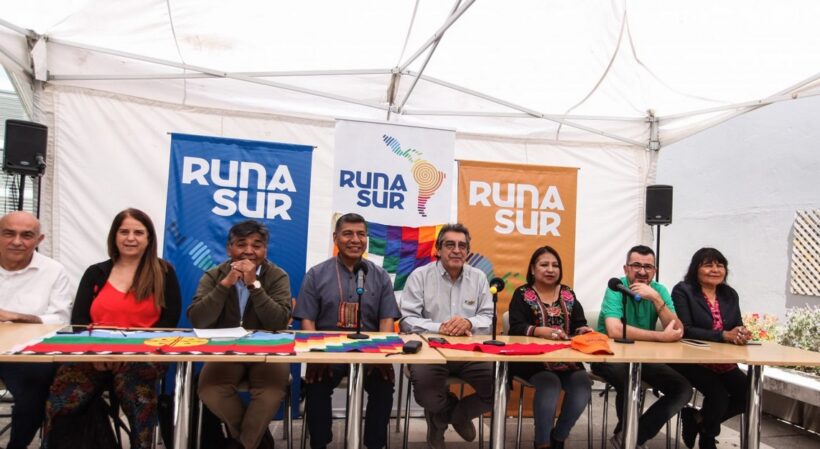This 5 and 6 November, the Plurinational Assembly will take place in Buenos Aires to constitute Runasur, the Unasur of the Peoples, under the guidelines of the defence of life, cultural identity and sovereignty from an anti-colonialist and anti-imperialist vision.
The meeting, to be held at the Club Banco Nación in Vicente López, will be attended by around a thousand comrades from indigenous and Afro-descendant movements, trade union centres and social organisations from 11 Latin American countries, as well as Evo Morales, former president of Bolivia and promoter of the initiative.
On the first day (5/11) there will be a tribute to 17 years of the “No to the FTAA” (Free Trade Area of the Americas), followed by a day of debate with the formation of six commissions: People’s Integration, Education and Culture, Politics, Mother Earth, Economy and Health.
On Sunday 6, the closing plenary will be held with the signing and pronouncement of the founding document to constitute the regional integration of a Plurinational America.
At the launch press conference, the Secretary General of the CTA Autónoma de Argentina Hugo “Cachorro” Godoy pointed out the character of RUNASUR as a tool to strengthen the links between the organisations and peoples of Our America with the aim of building and deepening democracy, sovereignty and plurinationality.
“Runasur arises from the strategy of the historic struggle of the peoples,” said Fernando Huanacuni, coordinator of the organisation. We are facing a multipolar emergency, Pachakutik, a time of change in which this first integration mechanism of the peoples for the peoples is emerging, he said.
The former Bolivian foreign minister stressed the need to defend popular and participatory democracies, sovereignty and the recovery and reconstitution of popular identity. It is a question of drawing up a regional agenda of struggle, resistance and access to power at the service of the people, he concluded.
Ramón Chanqueo of the Central Unitaria de Trabajadores de Chile also took the floor, who alluded to the recent constitutional setback in the Andean country, relating it to misunderstanding and ignorance, but also to the work that capitalism and imperialism have carried out in the heart of the people.
Humberto Correa, from the CGT of Colombia, underlined the key moment in the region, strengthened by the election of Lula and Gustavo Petro, while pointing out the importance of articulating: “We would have to be hand in hand to negotiate as a bloc”.
Martha Isabel Velázquez, from SUTEYM, Mexico, commented on the importance of the struggles to rescue indigenous peoples and their languages “so that they are not left isolated, abandoned”. “United, they will not be able to defeat us”, she stressed.
Guillermo Zucotti, leader of the CGT, said: “We are not going to replace the action of governments, but we have to be prepared for the threat of the advance of the right wing, and that has to drive the initiative of the popular movements”.
Silvia Almazán, leader of the CTA de los Trabajadores said: “We are the response to a neo-facist wave that wants to advance on the democracies we have built”.
Finally, María Fernanda Pereyra, member of the UTEP, proclaimed: “We are here to defend the sovereign homeland, the one that represents each and every one of us”.
There is no doubt that the winds of integration are once again blowing in the South, crossing the borders that divide peoples. Winds that today aspire not only to the strengthening of inter-state organisations, but also to the decisive participation of the peoples themselves and their organised collectives in the processes of unity.






